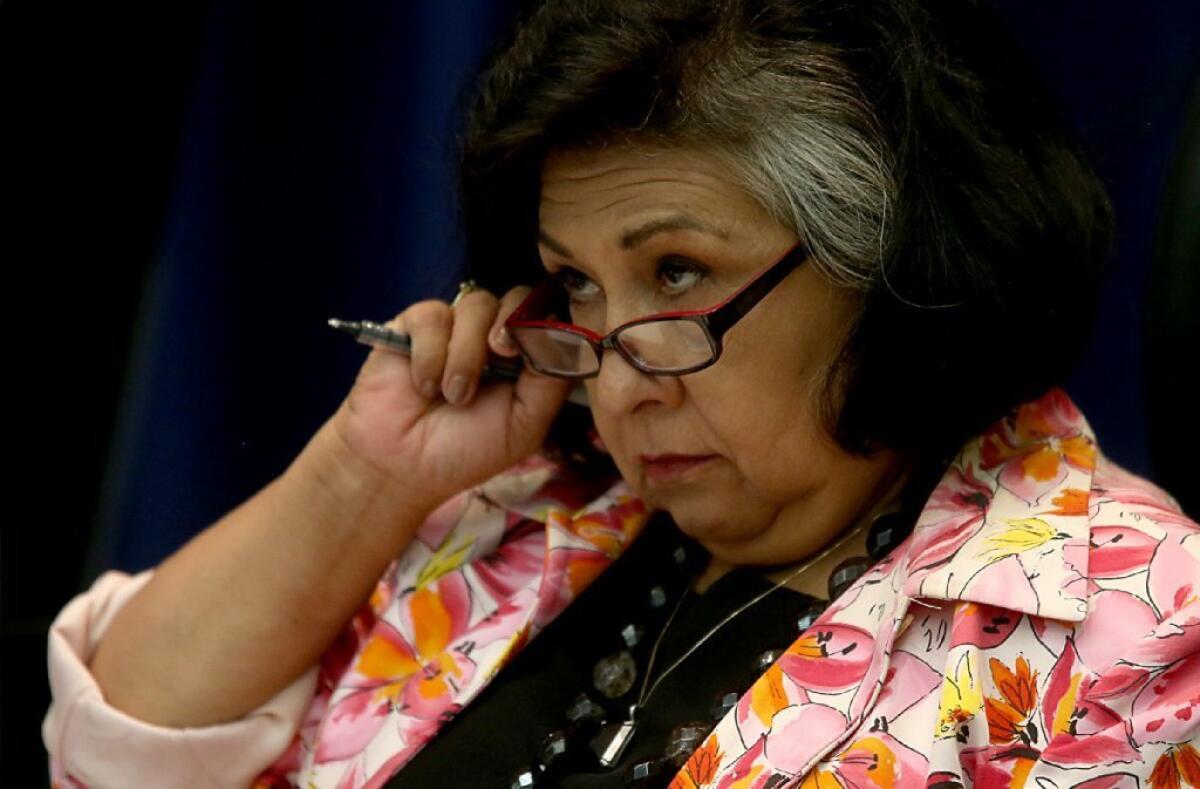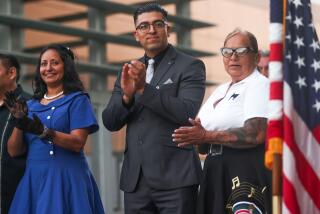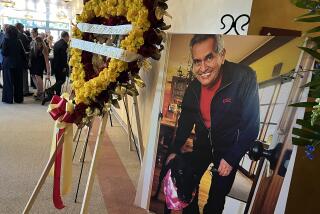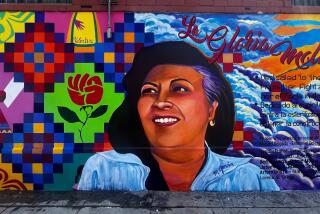Gloria Molina donates her papers to Huntington Library

With no room left on Mt. Rushmore, Gloria Molina has found another way to achieve lasting proximity to some of the Untied States’ greatest politicians: She capped her 23 years on the Los Angeles County Board of Supervisors by donating her papers to the Huntington Library, Art Collections and Botanical Gardens in San Marino.
Curators at the Huntington will decide just where the Molina archive — at least 250 boxes’ worth — eventually will be shelved. It’s conceivable her records could wind up close to papers of George Washington, Abraham Lincoln and Thomas Jefferson. In any case, she joins them in a collection that also includes documents from Mark Twain, Jack London and Charles Bukowski.
The reams of correspondence, reports, photographs and email printouts document Molina’s years as the first woman and first Latina elected to the Board of Supervisors, and some go back to the 1980s, when she became the first Latina elected to the California Legislature and to the Los Angeles City Council.
The Molina files join a collection that includes the papers of three other L.A. County supervisors dating back to the 1930s: John Anson Ford, Kenneth Hahn and Ed Edelman.
Molina said that as she entered her final year in office she hadn’t given any thought to what should become of the mountain of records that had accumulated since 1991 in her suite in the county Hall of Administration.
Then, she recalled, “I got a couple of calls from people asking about donating my papers. I found it sort of unusual that anybody would want this.”
The Huntington was avid for Molina’s records because its collecting interests include the social, political, cultural and literary history of California, Los Angeles and the West.
“It was a combination of her as the first Latina, and as a supervisor [whose records] give us a continuity” that now will span 80 years of history on the Board of Supervisors, said Jennifer Allan Goldman, a curator of manuscripts and archivist at the Huntington.
Ford was first elected in 1934, and the Molina papers give the library, and the credentialed scholars it serves, a window on county government that extends to her departure last month due to term limits.
Molina may not be quite done generating political or governmental papers of scholarly interest: She is running for a seat on the Los Angeles City Council in the March 3 primary, trying to oust incumbent Jose Huizar in District 14, which includes downtown and the Eastside.
Molina said that USC, UCLA and Loyola Marymount University also had made inquiries about acquiring her papers. But her friend Michael Stern, a Los Angeles Superior Court judge, helped steer the daughter of Mexican American farm workers to the elegant, 207-acre former estate of railroad and industrial magnate Henry Huntington that opened to the public in 1927 as a museum of art and historic books, maps and documents.
Stern told her, “Gloria, the best place is the Huntington, they do a great job and really are interested in Los Angeles and Los Angeles history,” Molina said.
As politicians are wont to do, she dispatched two of her staffers to check things out first, got a favorable report, and then visited the Huntington, confirming for herself what her advisors were saying. Now the papers will become a resource for researchers interested in Molina biographically, or in issues on which she took a prominent role.
“I didn’t review all 250 boxes, all I did was look at them” when they were stacked for removal in her office suite, the former supervisor said. Movers hired by the Huntington arrived on the Monday before Thanksgiving and took them away. Besides correspondence, printouts of emails and other papers, the contents include photographs and audio and video material.
A full accounting of the contents won’t be compiled until curators delve into the boxes piece by piece, said Goldman, who puts the number of boxes at 300 now, with perhaps 100 to 200 still to come. The ones in the Huntington’s possession don’t include Molina’s papers from 2013 and 2014, Goldman said, because of a county government rule that requires a two-year wait before such records can be released.
In a time-consuming, laborious process, Huntington Library staffers will identify each item, write a description for a digital index that will help scholars find what they need, and make sure that related papers are stored in the same folders or boxes.
“If we are able to put someone full time on this, we’ll probably be able to make the first group [of 250 to 300 boxes] available in two years,” Goldman said. “Her staff did an amazing job putting it in order, so it may be faster.”
The Huntington gives hands-on research access only to professors and PhD candidates who are working on their dissertations. Others can apply to be admitted, Goldman said, and there’s also the option of requesting that desired documents be copied. An addition, the Huntington’s digital library displays selected documents online.
Molina doesn’t have a PhD, but as the papers’ donor she has full access.
“Courtship is the right word” for the process by which the Huntington Library and other institutions try to persuade important people or their heirs to donate papers that could be of historical interest, Goldman said. Molina said that some of the universities that inquired about her papers also wanted her to donate money to help cover the cost of organizing and cataloging them. The Huntington attached no such strings, she said — although curator Goldman notes that the Huntington does welcome donations to expedite specific archiving projects.
The Molina repository at the Huntington will help scholars understand the actions, deliberations, causes and campaigns in which she has been involved. But she regrets not having created more of a personal record for herself.
“I always said I would write a journal, and I never did it,” she said. “I’ve always said to other Latinos, especially elected Latinos, that they should write their stories. It’s important that we chronicle what we have done, and what the environment is like when we are doing it.”
Follow @boehmm of the Los Angeles Times for arts news and features
More to Read
The biggest entertainment stories
Get our big stories about Hollywood, film, television, music, arts, culture and more right in your inbox as soon as they publish.
You may occasionally receive promotional content from the Los Angeles Times.











